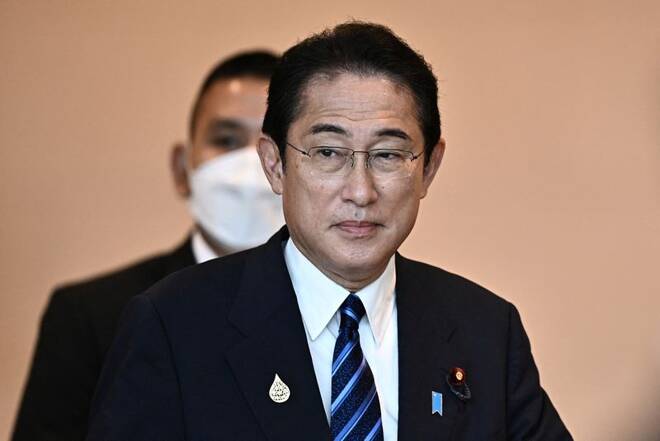Advertisement
Advertisement
Most Japanese firms don’t support PM Kishida, citing leadership, prices – Reuters Poll
By:
By Rocky Swift TOKYO (Reuters) - Managers at nearly two-thirds of Japanese companies have lost confidence in the administration of Prime Minister Fumio Kishida, citing dissatisfaction over his effectiveness and handling of inflation, according to a Reuters monthly survey.
By Rocky Swift
TOKYO (Reuters) – Managers at nearly two-thirds of Japanese companies have lost confidence in the administration of Prime Minister Fumio Kishida, citing dissatisfaction over his effectiveness and handling of inflation, according to a Reuters monthly survey.
Dissatisfaction among major corporations mirrors public opinion polls showing dwindling support for Kishida amid scandals that have taken down three of his ministers.
Among 400 companies polled, 63% of respondents said they did not support the administration. Uncertainty over Kishida’s economic growth strategy was the most commonly cited reason for dissatisfaction, followed by lack of policy execution and his response to the weak yen and rising prices.
“The government has failed to come up with effective countermeasures to ease the burden of rising prices on families,” said a manager at an industrial ceramics company, speaking on condition of anonymity. “Furthermore, the repeated resignations of cabinet ministers due to scandals makes it hard to stand by the administration.”
Inflation in Japan is running at a 40-year high, driven by soaring energy prices from the war in Ukraine and exacerbated by a steep drop in the yen. Almost 90% of companies polled said continuing inflation was the biggest risk they faced in 2023, and 68% said it should be a policy focus for the Kishida government.
“There are concerns that monetary tightening to combat inflation could lead to a slowdown in the global economy,” said a manager in the transportation sector.
Japan’s currency weakened past 151 to the dollar in October for the first time in 32 years, forcing the Ministry of Finance to intervene to support it. More than 80% of companies said they wanted the yen to trade no weaker than 130 per dollar next year, compared with this week’s rate of about 136 per dollar.
Still, that shows Japanese companies have got used to depreciation of the yen. In the November 2021 survey, 66% of firms said an exchange rate of 120 per dollar or weaker was negative factor for them.
“Overseas orders are strong due to the effect of the weakening yen,” said a manager in the metal products segment
On overall business sentiment, 78% said conditions would be “not so good” to “bad” by the end of three months, about the same as in the past two surveys.
But on their annual earnings outlook, corporate managers are more optimistic, with 78% expecting the same or better levels of profit next year. Capital expenditure is where 71% intend to focus their earnings, while 37% plan to spread it around through wage increases, a key policy thrust for Kishida.
Last December, 85% of firms expected profits to be stable or rise the following year, while 22% said they would focus earnings on wage hikes.
The Reuters Corporate Survey, conducted for Reuters by Nikkei Research between Nov. 22 and Dec. 2, canvassed 495 big, non-financial Japanese firms on condition of anonymity, allowing them to speak more freely.
(Reporting by Rocky Swift; Editing by Bradley Perrett)
About the Author
Reuterscontributor
Reuters, the news and media division of Thomson Reuters, is the world’s largest international multimedia news provider reaching more than one billion people every day. Reuters provides trusted business, financial, national, and international news to professionals via Thomson Reuters desktops, the world's media organizations, and directly to consumers at Reuters.com and via Reuters TV. Learn more about Thomson Reuters products:
Advertisement
